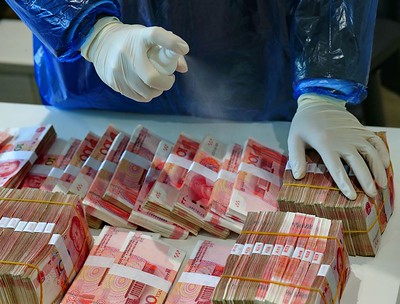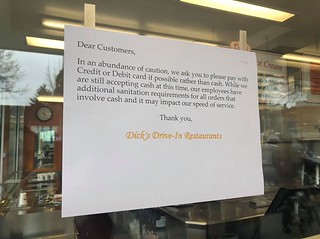
PREV ARTICLE
NEXT ARTICLE
FULL ISSUE
PREV FULL ISSUE
THE FEAR OF VIRUS-TAINTED DOLLARSThis Bloomberg article discusses how the fear of virus-tainted cash could boost the use of electronic payments. -Editor
Fear of dollars is now palpable in the U.S. epicenter of the coronavirus. And across the financial industry, a rigorous debate is brewing over how to address the public's mounting concern that greenbacks might transmit Covid-19. Studies show it's at least theoretically possible for other coronaviruses to survive on the dollar's cotton-and-linen weave, though there's little agreement on the actual risk of contagion. Behind the scenes, some industry groups and banks have been urging the Federal Reserve and Treasury Department to issue a statement assuring Americans that there's minimal risk for using cash, according to people with knowledge of the discussions. The Fed, in turn, says it's waiting for advice from the Centers for Disease Control and Prevention, which so far has said the virus spreads primarily through person-to-person contact. In the meantime, the Fed has been putting notes repatriated from Asia in quarantine for up to 10 days to ensure it's safe. The stakes are high for banks and companies handling electronic payments: Billions of dollars in profits hinge on whatever statement or policy authorities ultimately issue. The virus may end up serving as a "trigger event" for wider acceptance of cards long term, either persuading retailers to start taking them or prompting the government to force them, said Lisa Ellis, an analyst independent research boutique MoffettNathanson. The shift would be especially dramatic in regions of the world where card use is still relatively uncommon, she said. "Digital payments are already viewed as good for society by governments because they help with financial inclusion, they drive tax revenue and eliminate corruption," she said. "This is another reason: ‘Oh, and it's hygienic too.' Despite the increased popularity of credit and debit cards in recent years, cash still remains one of the most popular ways to pay for things in the U.S., accounting for 26% of all payments by consumers last year, according to data compiled by the Fed. Spare change and dollar bills are still overwhelmingly favored for small purchases, accounting for about 50% of payments under $10. 
A clerk disinfects banknotes in Suining, China To read the complete article, see:
Wayne Homren, Editor The Numismatic Bibliomania Society is a non-profit organization promoting numismatic literature. See our web site at coinbooks.org. To submit items for publication in The E-Sylum, write to the Editor at this address: whomren@gmail.com To subscribe go to: https://my.binhost.com/lists/listinfo/esylum All Rights Reserved. NBS Home Page Contact the NBS webmaster 
|
